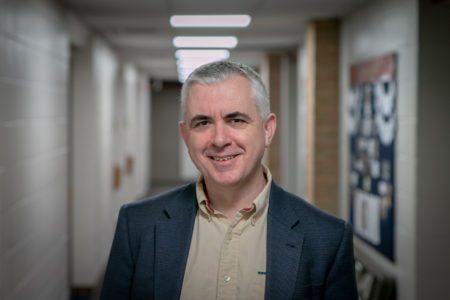When Dr. David Smith, who leads the de Vries Institute for Global Faculty Development at Calvin University, thinks back on memorable moments piloting modules for educators through a series similar to the new Christ-centered Learning Mentors program at Belmont, he remembers an African participant with a name that translates to “peace.”
This participant had long associated their name with quiet and “avoiding conflict and staying out of the way,” Smith recalled. And yet, the module on Educating for Shalom changed that perspective.
“Shalom in Isaiah, which is often translated ‘peace,’ means something much more holistic,” Smith said. “It’s more to do with well-being in every sense of the word – when you’re living in right relationship with other people, in right relationship with God, in right relationship with creation… A sense of everything functioning. It also has a justice component. A sense that there’s only shalom if members of the community are in right relationship with each other, and there isn’t oppression, suffering, marginalization.”
During the course, the participant’s name took on a new meaning for them. “It could mean pursuing justice, pursuing changing the world, reconciliation, all kinds of things,” Smith said – a whole new narrative of what a life might mean.
Of course, not all the participants in Smith’s courses have names that translate as peace, but the study he facilitates can be transformative nonetheless.

The Reflecting Faith series was developed by Smith and the de Vries Institute for Global Faculty Development at Calvin University. About a year and a half ago, a small cohort of 20 faculty from across all Belmont colleges helped pilot the program along with other educators from around the world. Now that the modules have officially launched, 12 faculty across various Belmont colleges are being trained as Christ-centered Learning Mentors on four modules that explore different facets of faith, learning and education. Next month, the 12 participants will begin inviting fellow faculty to consider becoming a part of small groups of faculty that will use the modules as catalysts for conversations about faith-animated teaching and learning.
In addition to Educating for Shalom, topics include Hospitality to the Stranger, Engaging Responsibly with Scripture, Faith and Pedagogy, and additional topics forthcoming. Each course is divided into three sections – Roots, Reflections and Applications, which encourage faculty to read scripture and the more recent work of diverse scholars while also discussing their findings and how they might apply what they learn in their work.
Smith says the courses have been written for folks of many cultural and theological backgrounds. “Our tradition at Calvin University is Reformed Protestant,” he continued. “And that’s clearly where we’re coming from. We’re not pretending to be anything else. But we are trying to write the courses so that the message is not that you have to think exactly the way we do or have to arrive at this set of conclusions. The modules offer a jumping off point for wide-ranging conversations on what Christ-centered learning can look like on various campuses and in various disciplines.”
Unlike the African participant’s story, the “everyday good stories,” Smith says, happen when educators have revelations about what they plan to carry forward in their classrooms. And there are certainly plenty of those stories. During the course on Educating for Shalom, for example, it has been fascinating to see how the course materials inspire Belmont educators across disciplines.
For Jeremy Lane, director of the School of Music, the study on shalom brought up the inequities in funding, facilities and qualified teachers in music education – especially outside school settings for pre-school children or older adults. With music and the arts as contributors to shalom and a healing tool amidst the brokenness of our world, he noted that he’d like to encourage active thinking for his music education students around these issues including research and planning to address better access in the community on a practical level.
Faculty across disciplines discussed their findings and encouraged one another in their study as well. For example, the study of shalom had Amy Smith, a law professor, thinking about teaching more chancery law and equity.
Lee Warren, an accounting professor, took an interest in Anthony Monica’s inspiration for his architecture students in confronting studio culture, which can turn unhealthy and overly competitive or obsessive if not managed well. “Modeling a positive example of a faithful dedication to finding wholeness and balance is critical as a groundwork for asking my students to do the same,” Monica wrote. “In my studio courses, I consciously build in reflection periods at the end of every project with my students to pause, come together, and reflect on how things are going in the class. ‘How did this last project go for you? Did the requirements surpass the point of a challenge to become a major stressor? Are you carving out time for rest? How would you change the next project? What could I have done better?’ I’ve found these conversations to be eye-opening and helpful for me to adjust or pivot as needed over the course of the class to ensure a healthy balance.”
Meanwhile, Amy Rasmussen, a professor of nursing, noted that she plans to incorporate aspects of shalom into lectures on pain management even as she took inspiration from her colleague’s comments. “It reminds me that some of the aspects of shalom in Isaiah are tangible (planting crops, building homes, having families),” she wrote, “and that those things are an integral part of shalom. The goal is not to lay around all day and not produce anything meaningful, but for our work to have dignity and reward embedded in it. Structures and organizations (as well as the people who lead them) have a responsibility to ensure the dignity of the work for every individual. What an important part of learning how to create systems!”
Learn more about Reflecting Faith here.



